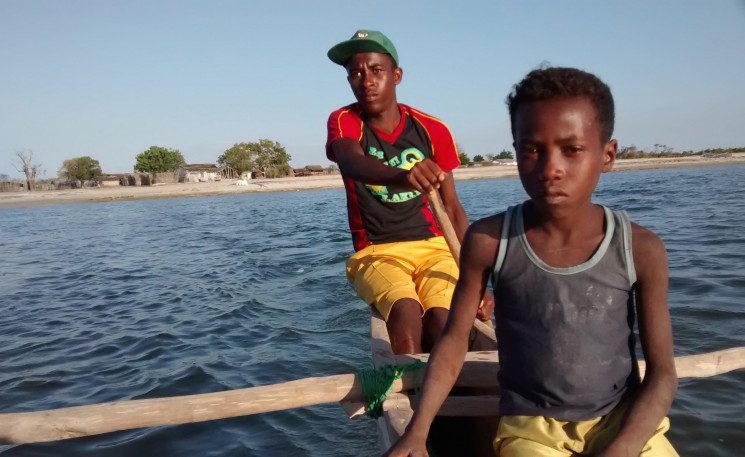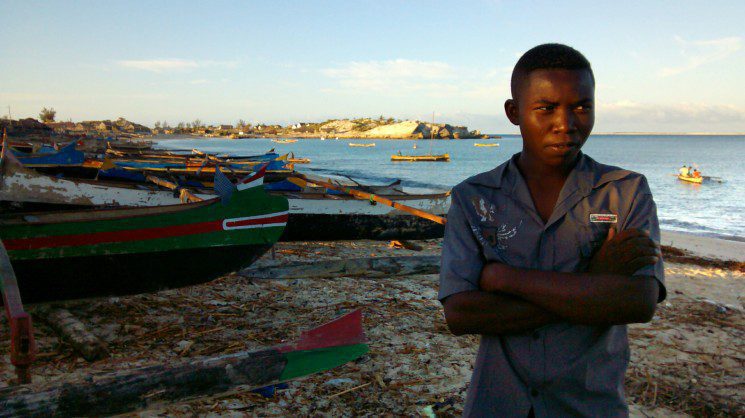By Paul Antion, Education Coordinator, Andavadoaka/Velondriake, Madagascar
Youth in rural southwest Madagascar face numerous challenges growing up, but are relentless in their pursuit of education and dreams of bright futures. Blue Ventures currently supports more than 230 students in Velondriake through our school scholarships programme, but we have personal relationships with over 500 youth and their parents through extra-curricular activities, environmental and health education, youth clubs, and one-on-one mentoring. Here are some of photos and stories from my conversations with a few of these students about their daily lives.

I was able to catch up with Eliasy (pictured in the back of the pirogue) during the school holidays, in his home village of Vatoavo. He gave me an extensive tour from the banks of the bay to old farm lands to the mangrove forest to abandoned houses. He is in the final class at the Sainte Famille middle school in Andavadoaka, and will be just the fourth person from Vatoavo to receive their middle school diploma.
“It’s difficult to see our village like this. Houses are empty because a good amount of people have left, running from bandits. [They returned again in the middle of the night just the week before, after a string of attacks a few months prior. Eliasy and his grandmother were the only ones not to flee to boats on the bay, as they slept through the attack.] No one is farming the land anymore because there hasn’t been enough rain in the past few years. The mangroves are getting all used up… But things are starting to change. Those who are still here are farming seaweed as an alternative livelihood. I have seen the size of some of the fish and crabs that are spilling over from the permanent mangrove reserve, and a few of us have even started replanting mangroves to ensure that there will still be some left for our future generations. So even though it looks like everything is gone now, I think we’ll see things start to come back to life very soon.”

Masamy and Eliasy have been the top two in their class for the past three years… Like many students, Masamy comes to study in Andavadoaka from another village, living in Andavadoaka throughout the week and returning to Ampasilava on the weekends. Her father and older siblings went north to better fishing grounds for the season, so it’s just her mother who is left taking care of her and her younger brother.
“It’s those walks that stress me out the most. When I walk home each Saturday, I pray that mum will have tea and boko boko (fried dough balls) waiting for me so that I can have a bit of a break before getting to work. If it’s low tide when I get back home I go out octopus gleaning, if not, I go to collect salt from the dried up salt lake nearby. With octopus gleaning you can go out and get two or three kilos, or you can get nothing. Whatever I make during that day and a half is what I take back to school with me. Often it’s enough for five cups of rice and tea in the mornings. So on the walk back to school, I pray that it will get me through the week. BUT then something magical happens. When I’m at school or studying in the youth clubs with Blue Ventures, I don’t think about it at all. It’s like learning is the medicine that cures my hunger. For instance, the other day working when we were working on an English dialogue about walking through the mangroves, it filled me up almost more than the bowl of rice.”
To help students like Masamy, we give ten cups of rice per month to those from outside of Andavadoaka so that they can stay and participate in our extra-curricular activities throughout the weekend.

Edmond is the youngest of seven. He was late coming back to school after going north to Maintirano with his older siblings from July to October, but is studying hard now, more motivated than ever. He is in the final class at the Sainte Famille middle school in Andavadoaka.
“My mother has been ill for a while now. It’s been difficult for her to support me on her own. So during our vacation I had to go up north with my older brothers and their families just to be able to live a bit more comfortably. If you ask my mother, she’ll tell you it was my punishment for struggling in school the past few years. It sure was hard work! I’m Vezo so I know how to sail and I know how to fish, but it’s different when you’re doing it for your livelihood. They all dropped out of school to become fishermen. This was my first time going up north with them but they’ve been doing it for years now. They go up north each year because you get better prices for what you catch. But you have to go out every day. Not only does it take a toll on your body, it’s dangerous too, free-diving around 20 meters on average over and over again for sea cucumbers. Someone even lost their hand to a shark while we were up there. I think I’d prefer to stay in school even if it’s difficult. While helping out my brothers I saw with my eyes that “there is nothing too difficult that hard work can’t overcome” (Malagasy proverb).
Find out more about our education and community engagement work here.
Browse more stories here.

